Morning Metals Call
Thursday, June 6, 2024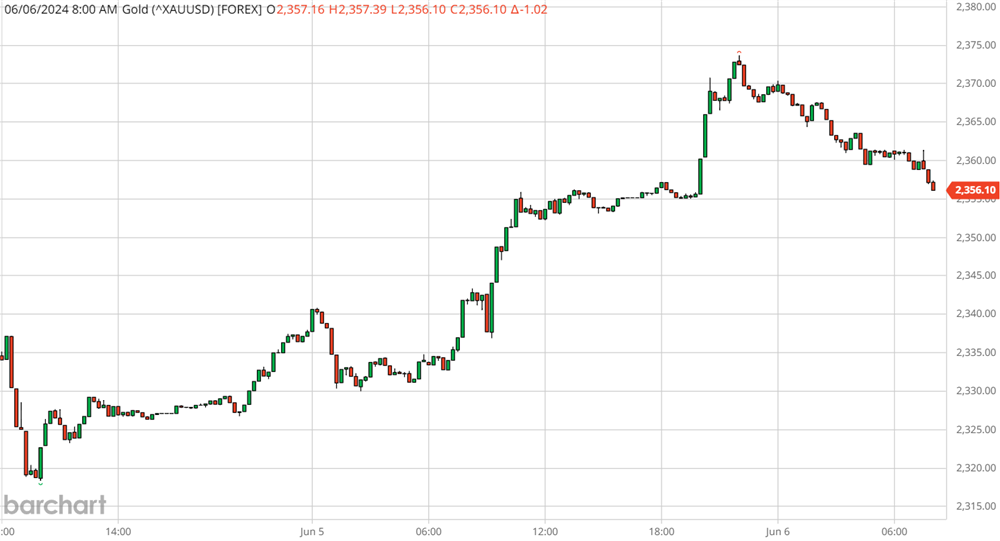

6/05/2024
The metals await additional data for Fed rate cut timing cues
OUTSIDE MARKET DEVELOPMENTS: The market is expecting a print of +175k for this morning's ADP survey number, and will hope to glean some insight into Friday's payrolls report. JOLTS job openings fell in April to the lowest level since February 2021. Signs of weakness in the labor market would likely pull forward Fed rate cut expectations.
Traders will also be watching Services ISM and PMI to see if the weakness revealed in the manufacturing sector earlier in the week is also evident in the services sector. The ISM prices component is expected to moderate somewhat.
Additional signs of a slowing economy and cracks in the heretofore resilient labor market would ramp the likelihood of a Fed rate cut, but the prospects of anything happening at the June 12 FOMC meeting remain remote. While the timing of that first cut is data-dependent, Fed funds futures currently indicate the Fed won't start easing until November.
The Bank of Canada is expected to cut rates by 25 bps today. The ECB is likely to follow suit tomorrow.
With the first Fed rate cut still thought to be some ways down the road, widening interest rate differentials should provide some underpinning for the dollar. The dollar index hit a near-two-month low on Monday before rebounding modestly.
GOLD
OVERNIGHT CHANGE THROUGH 6:00 AM CDT: +$6.78 (+0.29%)
5-Day Change: -$3.98 (-0.77%)
YTD Range: $1,986.16 - $2,449.34
52-Week Range: $1,812.39 - $2,449.34
Gold is higher in early U.S. trading on Wednesday with price action confined to the previous day's range. The weakness seen on Tuesday was successfully contained by Monday's low at $2,315.47.
The secondary tier of support is $2,307.65 down to $2,300.00, which is likely to keep the May low at $2,281.97 at bay. While the underlying trend in gold remains decidedly bullish if $2,281.97 gives way, a more protracted corrective phase would be indicated.
Consolidative trading may prevail until Friday's nonfarm payrolls report. The market is expecting a payrolls increase of 195k and the unemployment rate to hold steady at 3.9%.
Deviations from market expectations could set at least the near-term tone for gold. A beat would likely weigh on the yellow metal as the rate cut likelihood would remain in the Nov-Dec timeframe. A significant miss on the other hand would pull rate-cut expectations closer to the present, perhaps even July.
On the upside, chart resistance at $2,361.54/81 is needed to return confidence to the longer-term uptrend. Intervening chart resistance has developed at $2,352.32/$2,357.11.
SILVER
OVERNIGHT CHANGE THROUGH 6:00 AM CDT: +$0.102 (+0.35%)
5-Day Change: -$2.348 (-7.35%)
YTD Range: $21.945 - $32.379
52-Week Range: $20.704 - $32.379
Silver tumbled to a 3-week low of $29.413 on Tuesday. Price action today has thus far been confined to the low end of yesterday's range.
The short-term oversold condition may be a limiting factor on the downside ahead of Friday's jobs data, but the technical bias remains to the downside. Penetration of $29.413 would clear the way for additional losses to a retracement level support at $29.214.
The fundamentals for silver remain broadly supportive. The push to more-than-11-year highs above $30 several weeks ago was a significant technical event as well.
Chinese silver imports may surge in the coming weeks due to a significant premium being paid in Shanghai to satisfy strong industrial demand. “A wave of imports into China is going to drain the free float away from the West even further,” said Daniel Ghali, senior commodity strategist at TD Securities Inc. in a recent mining.com article.
Silver needs to reclaim the $30-handle to ease short-term pressure on the downside. However, $31 is the more important level to watch with respect to returning credence to the underlying uptrend. The highs from earlier this week at $30.733/825 now define a solid intervening chart barrier.
Please subscribe to receive this report via email by clicking here.
Peter A. Grant
Vice President, Senior Metals Strategist
Zaner Metals LLC
Tornado Precious Metals Solutions by Zaner
312-549-9986 Direct/Text
[email protected]
www.ZanerPreciousMetals.com
www.TornadoBullion.com
X: @GrantOnGold
X: @ZanerMetals
Facebook: @ZanerPreciousMetals
Non-Reliance and Risk Disclosure: The opinions expressed here are for general information purposes only and should not be construed as trade recommendations, nor a solicitation of an offer to buy or sell any precious metals product. The material presented is based on information that we consider reliable, but we do not represent that it is accurate, complete, and/or up-to-date, and it should not be relied on as such. Opinions expressed are current as of the time of posting and only represent the views of the author and not those of Zaner Metals LLC unless otherwise expressly noted.
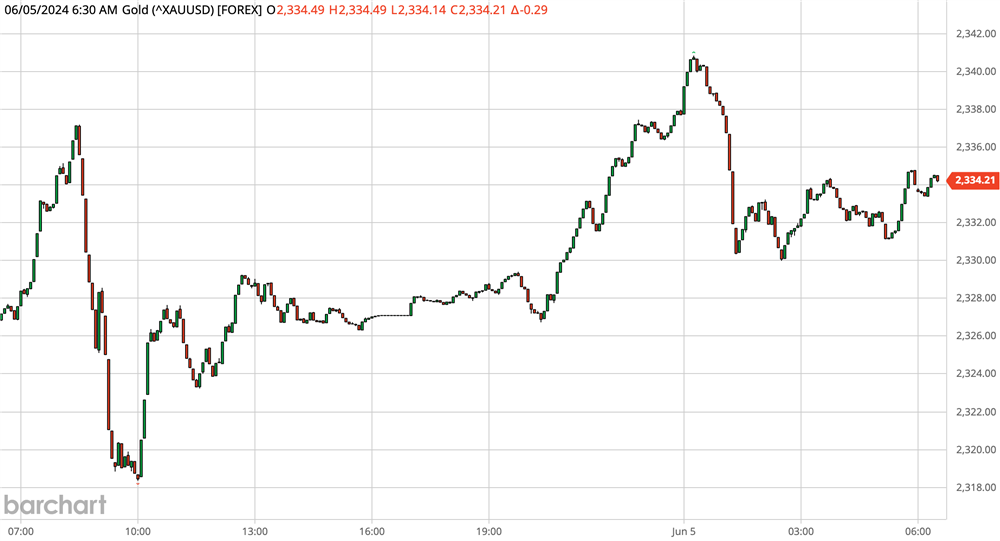
6/04/2024
A significant slowdown in PBoC gold buying in April weighs
OUTSIDE MARKET DEVELOPMENTS: Today's U.S. calendar features April factory orders. Median expectations are for a 0.6% rise, down slightly from a revised +0.7% in March. The market has already displayed some concern about growth risks in light of recent data, so a miss on factory orders could further reinvigorate rate-cut bets.
For now, those growth risks are pressuring stocks and yields.
The ECB may cut rates as soon as this week's meeting (June 6). ECB President LaGarde has signaled a "strong likelihood" of a 25 bps cut. The ECB's Stournaras said early last month that the central bank now sees "three interest rate cuts in 2024 as the most likely scenario."
Analysts at Heraeus speculate that a weaker euro could spark European investment in gold as a devaluation hedge. European outflows from gold ETFs have been pretty consistent this year. It would be encouraging to see that trend reversed.
News that the PBoC added less than 2 tonnes of gold to reserves in April is weighing on the yellow metal. Aside from that, The World Gold Council's latest report was largely upbeat, showing an eleventh consecutive month of net purchases and a rebound from March.

Oil and copper losses may be weighing on the broader commodities complex amid demand worries. At the same time, a drop in oil prices just as the summer driving season begins reduces inflation pressures and bodes well for the Fed rate cut scenario.
The market will be paying close attention to the jobs data on Friday to see if the labor market remains resilient.
GOLD
OVERNIGHT CHANGE THROUGH 6:00 AM CDT: -$21.56 (-0.917%)
5-Day Change: -33.42 (-1.42%)
YTD Range: $1,986.16 - $2,449.34
52-Week Range: $1,812.39 - $2,449.34
Gold formed a simple reversal day on Monday (lower low, higher close), but was unable to sustain the gains. Price action remains confined to yesterday's range (inside day).
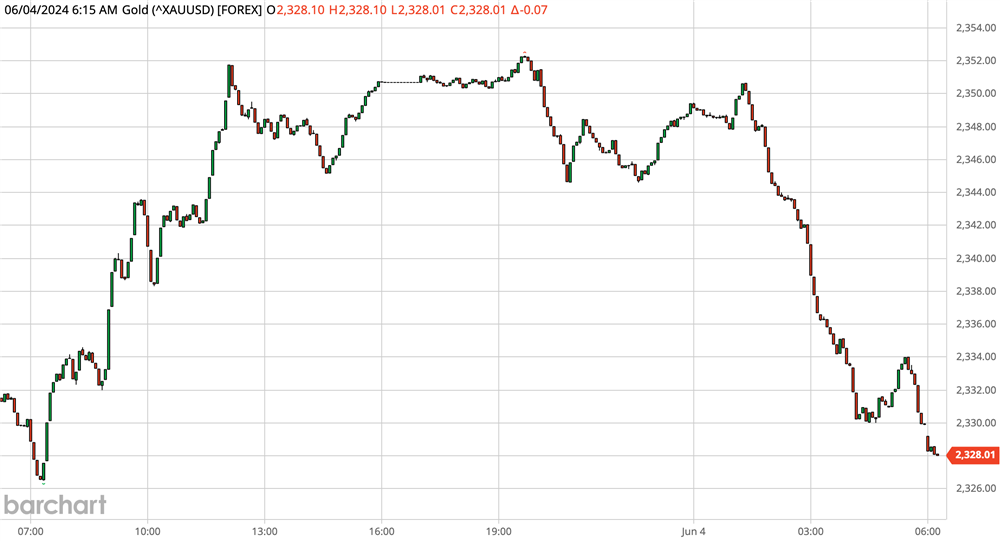
Monday's low at $2,315.47 has not been challenged, leaving the more important $2,307.65/$2,300.00 zone protected. While the short-term corrective tone remains bearish, I don't believe the May low at $2,281.97 is in jeopardy, at least not before Friday's jobs report. Look for some base-building price action over the next several sessions.
I'd still like to see good chart resistance at $2,361.54/81 exceeded to return a measure of confidence to the underlying uptrend. Yesterday's high at $2,351.75 along with last Friday's high at $2,357.11 now provide intervening barriers.
SILVER
OVERNIGHT CHANGE THROUGH 6:00 AM CDT: -$1.01 (-3.29%)
5-Day Change: -$2.365 (-7.37%)
YTD Range: $21.945 - $32.379
52-Week Range: $20.704 - $32.379
Silver tumbled in overnight trading, retracing all of Monday's rebound and setting a new cycle low at $29.699. These were the first trades below $30 in more than 2-weeks.
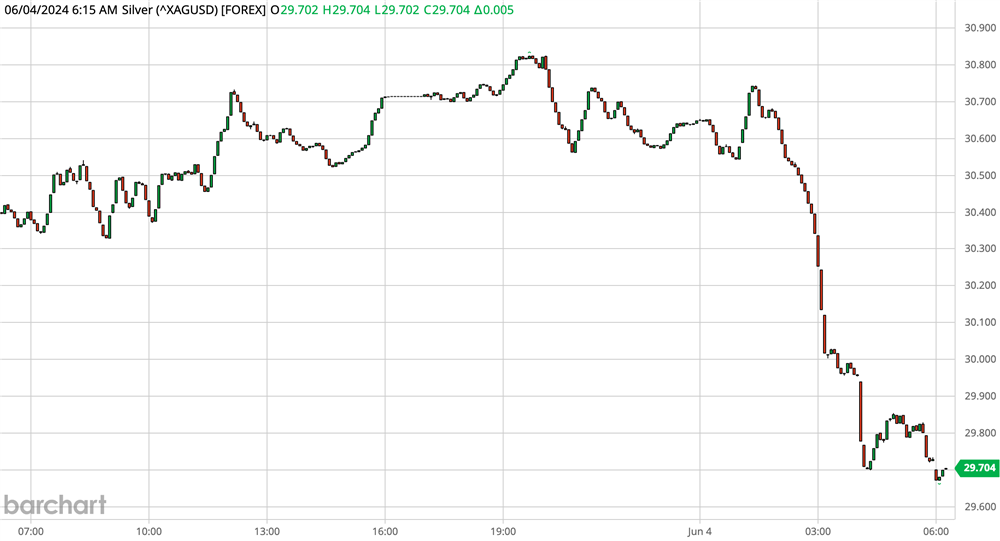
Short-term focus remains squarely on the downside, with the next level of support at $29.214, which is marked by the halfway back point of the leg-up from $26.049 (May 2 low) to the recent cycle high at $32.379 (May 21 high).
I'd like to see silver trade convincingly back above $31 to return some confidence to the uptrend. Suddenly that level is quite a ways away with the overseas high at $30.825 marking intervening resistance.
Please subscribe to receive this report via email by clicking here.
Peter A. Grant
Vice President, Senior Metals Strategist
Zaner Metals LLC
Tornado Precious Metals Solutions by Zaner
312-549-9986 Direct/Text
[email protected]
www.ZanerPreciousMetals.com
www.TornadoBullion.com
X: @GrantOnGold
X: @ZanerMetals
Facebook: @ZanerPreciousMetals
Non-Reliance and Risk Disclosure: The opinions expressed here are for general information purposes only and should not be construed as trade recommendations, nor a solicitation of an offer to buy or sell any precious metals product. The material presented is based on information that we consider reliable, but we do not represent that it is accurate, complete, and/or up-to-date, and it should not be relied on as such. Opinions expressed are current as of the time of posting and only represent the views of the author and not those of Zaner Metals LLC unless otherwise expressly noted.

6/03/2024
Weaker U.S. manufacturing data revives hopes for a Fed rate cut this year
OUTSIDE MARKET DEVELOPMENTS: U.S. manufacturing ISM and construction spending missed expectations this morning. Interest rates and the dollar tumbled in reaction, providing some supportive buying in the precious metals.
These indications of a slowing U.S. economy revived expectations that the Fed may still cut rates this year. Last week we saw the Fed's preferred measure of inflation holding steady at 2.7% y/y, which lends additional credence to the rate cut scenario.
However, recent FedSpeak has leaned more hawkish. Even today, Minneapolis Fed President Kashkari said the central bank is on hold for an "extended period."
Last week's Personal Income report for April came in largely as expected, with the Fed's preferred measure of inflation holding steady at 2.7% y/y
Manufacturing news out of China was more encouraging. The Caixin PMI reading for May came in at 51.7, indicating China's manufacturing sector grew at its fastest pace in two years.
Focus later this week will be on Wednesday's U.S. services PMI and ISM, as well as Friday's nonfarm payrolls report. Median expectations are for an increase of 195k jobs in May. The jobless rate is expected to hold steady at 3.9%.
GOLD
OVERNIGHT CHANGE THROUGH 6:00 AM CDT: -$3.83
YTD Range: $1,986.16 - $2,449.34
52-Week Range: $1,812.39 - $2,449.34
Gold ended May with a gain of 1.8%, despite the retreat from the $2,449.34 record high set on May 20. It was the fourth consecutive monthly gain. Through the end of May, the yellow metal is up 14.3% YTD.
While the near-term tone is corrective as the first trading week of June commences, the underlying trend remains bullish. While the yellow metal completed a 61.8% retracement of the latest leg-up in the rally in overseas trading today, the extent of the correction off the all-time high has been just 5.5% thus far.
There's decent chart support at $2,307.65 down to $2,300.00. Today's intraday low at $2,315.47 now marks a good intervening barrier. At this point, I consider more important support marked by the May low at $2,281.97 to be well protected.
A higher close today, above $2,327.82 would be encouraging. A trade above Friday's high at $2,357.11 and a higher close would be better yet for the bulls. A rise above good chart resistance at $2,361.54/81 would return additional confidence to the underlying uptrend.
SILVER
OVERNIGHT CHANGE THROUGH 6:00 AM CDT: +$0.019
YTD Range: $21.945 - $32.379
52-Week Range: $20.704 - $32.379
Silver posted a solid 15.7% gain in May, its third consecutive higher monthly close. That's pretty impressive, given that silver ended the month nearly $2 off the more-than 10-year high that was set on May 21 at $32.379.
While important chart support at $30.077/079 was violated in overseas trading, downside follow-through was minimal. The sell-off in the dollar following data misses helped push the white metal back into positive territory for the day. As of this writing, silver is up more than 50¢ above the $29.908 intraday low.
A convincing push back above $31.00/08 is needed to return confidence to the underlying bullish trend. Until then, the short-term bias remains to the downisde.
Please subscribe to receive this report via email by clicking here.
Peter A. Grant
Vice President, Senior Metals Strategist
Zaner Metals LLC
Tornado Precious Metals Solutions by Zaner
312-549-9986 Direct/Text
[email protected]
www.ZanerPreciousMetals.com
www.TornadoBullion.com
X: @GrantOnGold
X: @ZanerMetals
Facebook: @ZanerPreciousMetals
Non-Reliance and Risk Disclosure: The opinions expressed here are for general information purposes only and should not be construed as trade recommendations, nor a solicitation of an offer to buy or sell any precious metals product. The material presented is based on information that we consider reliable, but we do not represent that it is accurate, complete, and/or up-to-date, and it should not be relied on as such. Opinions expressed are current as of the time of posting and only represent the views of the author and not those of Zaner Metals LLC unless otherwise expressly noted.
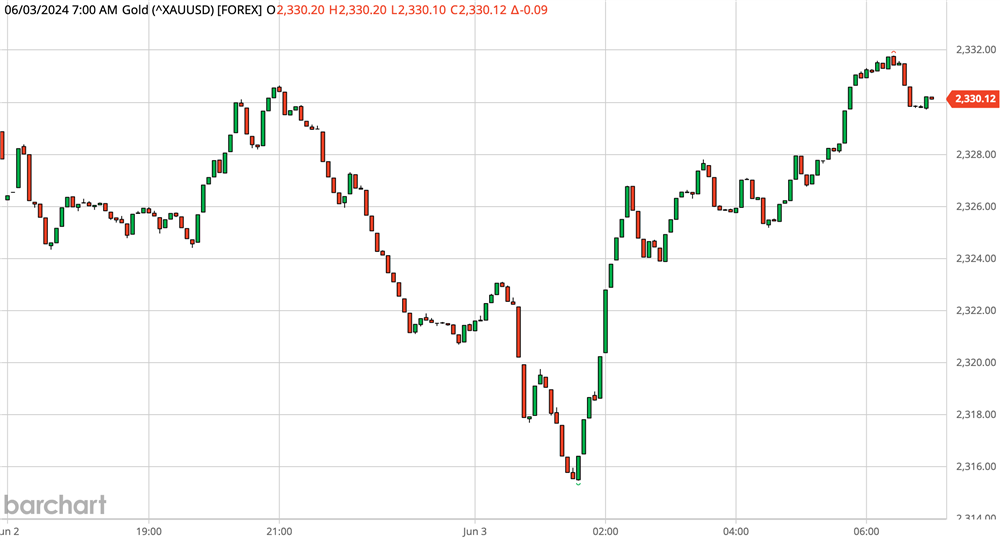
While there was continued divergence between gold and silver yesterday, gold was able to hold its ground in positive territory and finished Thursday with a mild gain.
In contrast, silver was the weaker market as it closed with a heavy loss. The declines in silver were outsized and were likely the result of profit-taking by aggressive Asian buyers over the prior two weeks.
It should be noted that Chinese silver prices reached a significant premium to spot prices recently resulting in Chinese buying international silver and reducing their risk to the weakness in their currency...[MORE]
Please subscribe to receive the full report via email by clicking here.
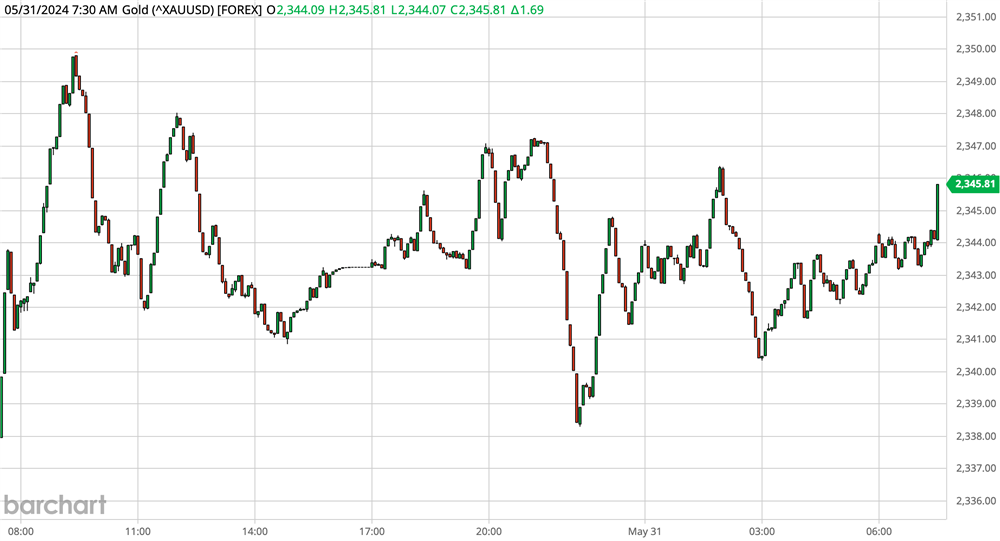
With the dollar overnight breaking out to the highest level since May 14th, US treasury yields nearing the highest levels of the month and critical US inflation data from the quarterly PCE report to be released tomorrow, traders should expect an expansion of volatility in gold.
Divergence between gold and silver extended yesterday with silver remaining strong, gold showing weak, and silver adding to its recent show of sector leadership.
However, we suspect strength in the dollar and rising global interest rates undermined sentiment and might have prompted some gold longs to exit ahead of tomorrow's US PCE data...[MORE]
Please subscribe to receive the full report via email by clicking here.